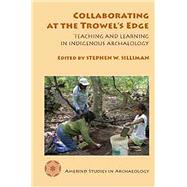
| Foreword | p. vii |
| Acknowledgments | p. xi |
| Collaborative Indigenous Archaeology: Troweling at the Edges, Eyeing the Center | p. 1 |
| Methods and Practices in Archaeological Field Schools | |
| Field Schools without Trowels: Teaching Archaeological Ethics and Heritage Preservation in a Collaborative Context | p. 25 |
| The Tribe and the Trowel: An Indigenous Archaeology and the Mohegan Archaeological Field School | p. 50 |
| Working on Pasts for Futures: Eastern Pequot Field School Archaeology in Connecticut | p. 67 |
| Summer Workshops in Indigenous Archaeology: Voluntary Collaboration between Colgate University and the Oneida Indian Nation of New York | p. 88 |
| Field School Archaeology, Activism, and Politics in the Cayuga Homeland of Central New York | p. 103 |
| Indigenous Archaeology and Education | |
| Pedagogy of Decolonization: Advancing Archaeological Practice through Education | p. 123 |
| Building Pathways between Zuni and Mashantucket Pequot Country | p. 145 |
| A Critical Change in Pedagogy: Indigenous Cultural Resource Management | p. 165 |
| 'Ihoosh'aah, Learning by Doing: The Navajo Nation Archeology Department Student Training Program | p. 188 |
| Reflections on Collaborative Indigenous Archaeology | |
| Collaborative Research Programs: Implications for the Practice of North American Archaeology | p. 211 |
| Melding Science and Community Values: Indigenous Archaeology Programs and the Negotiation of Cultural Differences | p. 228 |
| References Cited | p. 251 |
| About the Editor | p. 293 |
| About the Contributors | p. 295 |
| Index | p. 301 |
| Table of Contents provided by Ingram. All Rights Reserved. |
The New copy of this book will include any supplemental materials advertised. Please check the title of the book to determine if it should include any access cards, study guides, lab manuals, CDs, etc.
The Used, Rental and eBook copies of this book are not guaranteed to include any supplemental materials. Typically, only the book itself is included. This is true even if the title states it includes any access cards, study guides, lab manuals, CDs, etc.